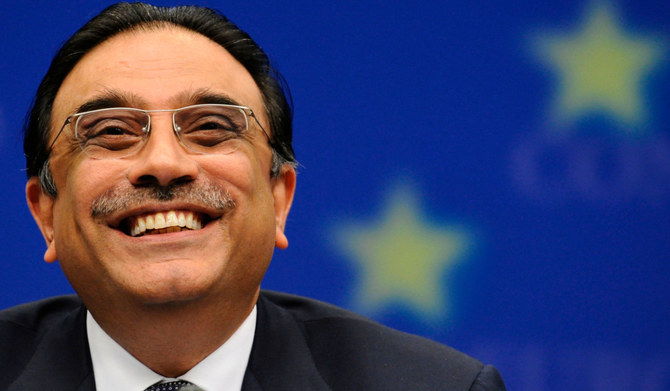ISLAMABAD: Prime Minister Shehbaz Sharif on Saturday congratulated his coalition partner Asif Ali Zardari for being elected as the country’s president for the second time, after securing 255 votes in the indirect electoral contest held in Pakistan’s parliament and provincial assemblies.
Zardari was nominated for the post by the ruling coalition led by Sharif. He stood against Mahmood Khan Achakzai, backed by the jailed former prime minister, Imran Khan.
Lawmakers started arriving in the national and provincial legislatures in the morning, as polling began at 10 a.m. and continued until 4 p.m.
“The votes acquired by Asif Ali Zardari (are) 255,” the Islamabad High Court’s Chief Justice Aamir Farooq, who was presiding over the presidential election at the joint sitting of parliament, announced.
Sharif said Zardari’s victory proved that the country had expressed confidence in his leadership.
“President Asif Ali Zardari will be a symbol of the federation’s strength,” he continued, adding that his election represented the continuity of democratic values.
Sharif said he was optimistic that Zardari would fulfill his constitutional responsibilities as president in the best manner, adding that allied parties would work together for the development and prosperity of the country.
During his last tenure as president from 2008 to 2013, Zardari ushered in constitutional reforms, including the 18th amendment, to ensure larger autonomy for the provinces, and rolled back presidential powers.
On Friday, his predecessor Arif Alvi was accorded a farewell guard of honor. Alvi’s five-year term ended in September last year, but in Pakistan, a president may continue to stay in office constitutionally until his successor is elected.
The tenure of Alvi, who took the oath of office on Sept. 9, 2018 after Khan’s Pakistan Tehreek-e-Insaf party came to power the same year, was marked by political instability and civil-military tensions, and saw the ouster of Khan in a parliamentary no-trust vote in April 2022.
Besides political instability, an economic crisis gripped Pakistan during this period, with the South Asian country barely averting a default in June last year by securing a $3 billion bailout deal from the International Monetary Fund.
























